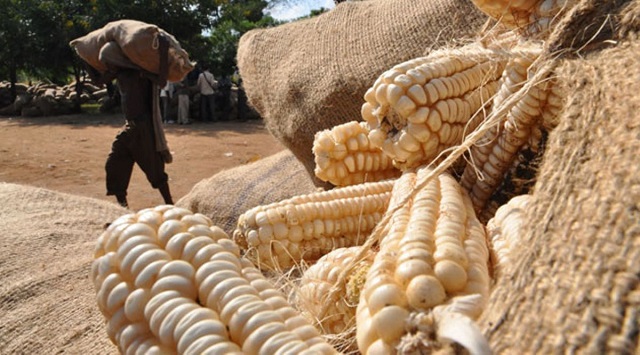
Kenya alleges maize imports from Uganda and Tanzania have high levels of mycotoxins that are consistently beyond safety levels
Kampala, Uganda | THE INDEPENDENT | There are questions lingering as to why Kenya abruptly banned Uganda’s maize exports to the country disregarding all EAC protocols.
The last related incident was in 2018 when 600 metric tonnes worth about Shs 180 billion was returned by Kenya claiming it had traces of aflatoxin among other standard issues.
The ban was communicated by Kenya’s Agriculture and Food Authority to the Commissioner Customs at Kenya Revenue Authority.
The Authority says they have been conducting studies which revealed that maize imports from Uganda and Tanzania had high levels of mycotoxins that were consistently beyond safety levels.
Aflatoxins are poisonous substances produced by certain kinds of fungi (moulds) that are found naturally all over the world, and according to World Health Organisation, they can contaminate food crops and pose a serious health threat to humans and livestock.
WHO adds that aflatoxins also pose a significant economic burden, causing an estimated 25% or more of the world’s food crops to be destroyed annually.
The government of Uganda admits the high prevalence of aflatoxins in produce especially maize, sorghum, millet, groundnuts and cassava, and has put in place measures to control it.
A study done for 12 years up to 2018 and published in an online journal, Science Direct, shows that Uganda loses US$ 577 million (Shs 200 billion) annually as a result of 3,700 aflatoxin-induced liver cancer cases.
In addition, the aflatoxin-related illnesses cost the government of Uganda an extra US$ 910,000 on health services according to the study.
Uganda through the Uganda National Bureau of Standards, UNBS, has developed standards against aflatoxin in the affected products and harmonized them with the East African Community standards. The standards have been used to test the quality for grain meant for both the local and the export markets.
UNBS Acting Executive Director David Livingstone Ebiru says that together with other agencies, they have been conducting surveys on millers in and around Kampala and sensitizing them on grain standards especially regarding aflatoxins.
He says the efforts are important not only for the health of Ugandans, but also for the export markets including the World Food Program which has offered Uganda a US$ 4.5 million market for maize this year.
According to Uganda Bureau of Statistics, on annual basis, 2.8 million metric tons of maize in Uganda is produced, but it is not clear how much of this ends up contaminated.
The annual exports of maize to Kenya are estimated at US$ 720 to US$ 900 million, according to figures at the Bank of Uganda.
According to preliminary estimates by the US-based Famine Early Warning Systems Network, 2020/21 production in Uganda was higher than 2019/20, and was also higher than five-year average levels.
Uganda produced 14% of the maize in the East African Community, Ethiopia and Somalia account for 30% of the exportable surplus. However, the government as well as the Grain Council of Uganda say the export market especially to Kenya is being hurt by informal traders both in Uganda and in Kenya who do not follow the laid-out procedure.
“Kenyan traders come into the country and go directly to the farmers to get maize and end up buying through uncontrolled channels,” says Chris Kaijuka, the chairman of the Grain Council.
There are views in the public that the ban by Kenya is just another non-tariff barrier aimed at protecting her own maize industry. Minister Frank Tumwebaze, a farmer wondered why Kenya issued a ban without warning saying this is against the EAC treaties. “Why can’t such issues be discussed under the forums of the EAC before unilateral country decisions are taken at the detriment of the other community members?” he wondered.
Former Commissioner Customs at the Uganda Revenue Authority, and newly elected MP for Sheema Municipality Dicksons Kateshumbwa calls on the EAC countries to stop violating the protocols for the survival of the community.
“Such unilateral decisions have undermined free trade in EAC. If I recall, we have EAC which harmonized standards, so how does it come to this? It started with milk, tiles, beef, etc. I believe Uganda’s only crime is having closed in the trade deficit. It caught our neighbors by surprise,” says Kateshumbwa.
“Granted! Have they just realized that our maize is bad? Many Kenyans actually rent land on the Ugandan side and grow maize and export to Kenya over the years. The game usually is to hide behind standards and take unilateral actions without following the Common Market Protocol.” Section 1 of Article 21 of the EAC Customs Union Protocol states, partner states are supposed to prevent any anti-free trade practices.
“The partner states shall prohibit any practice that adversely affects free trade including any agreement, undertaking or concerted practice which has its objective or effect the prevention, restriction or distortion of competition within the community,” it states.
Article 22 (2) adds, “A partner state shall not exercise the right to introduce or continue to execute the restrictions or prohibitions conferred by this Article in order to restrict the free movement of goods within the Community.”
The rules give partner states an obligation to notify the secretary general of the intended introduction of restrictions. The International Institute of Tropical Agriculture has partnered with the National Agriculture Research Organisation with funding from aBi Development Ltd to finalize the development of Aflasafe, a solution described as a safe and effective natural product to manage aflatoxin in crops.
The process launched in August last year, if successful will see a reduction in the levels of contamination of the produce.
Zitto Kabwe, the leader of Tanzania’s opposition party Alliance for Change and Transparency said in a statement that Kenya’s concern can be handled through the EAC framework on aflatoxin in trade
“Aflatoxins are not new and there is a mechanism in place for the EAC to deal with them. So long as EAC is a common market, Kenya must respect the treaty. This Kenyan letter should go to the EAC Council of Ministers and Kenya provides evidence of her claim.”
*****
URN
 The Independent Uganda: You get the Truth we Pay the Price
The Independent Uganda: You get the Truth we Pay the Price



Many thank goes to Zitto Kabwe, For what he has commended.
NO NO evidence is highly needed over that say. Because we need to know and come out with what to do about it. because Kenya we need you and also us Ugandans we need use in Agriculture.